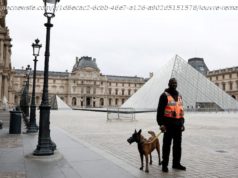Concern mounts as the „new normal involving tariffs and protectionism“ threatens rules-based international order.
When does a feud become a separation? A separation a divorce? When do arguments, sharp-tongued put-downs and perceived betrayal among allies become the collapse of the Western-dominated order that has ruled the world, under US leadership, for the past seven decades?
As each day brings a new series of punches and counterpunches between President Donald Trump and longtime US partners, the question appears to be moving beyond the realm of the academic.
The most recent episode began with Friday’s Group of Seven summit in Quebec, the annual chat-fest with the United States and the world’s other self-described economic leaders, including Britain, Canada, France, Germany, Italy and Japan. It followed Trump’s decision not to exempt any of them from new US „national security“ tariffs on steel and aluminum imports.
That ruling came on the heels of nearly 18 months of clashes over climate change, trade, NATO, Iran and other issues on a list so long it is hard to remember everything on it.
„What worries me most . is the fact that the rules-based international order is being challenged,“ European Council President Donald Tusk said as the G-7 summit got underway. What is surprising, Tusk said, is that the challenge is driven not by the „usual suspects, but by its main architect and guarantor, the US“
Trump’s actions, he said, „play into the hands of those who seek a new post-West order where liberal democracy and fundamental freedoms would cease to exist.“ Tusk’s usual suspects certainly include China and Russia, the latter suspended from the group after its 2014 annexation of Crimea. As Trump he left Washington early Friday, he said Russia should be invited „back in“ to the club.
Canadian Prime Minister Justin Trudeau and French President Emmanuel Macron held a news conference in Quebec on Thursday to hail their own close relations and said they would continue, politely, to try to convince Trump that his actions are „unacceptable“ and counterproductive, even for American workers.
Trump responded with a series of tweets Friday morning, saying he was headed to Quebec to „straighten out“ US allies. „If it doesn’t happen,“ he declared, „we come out even better.“
In any case, Trump told reporters as he left the White House for Canada, eventually „we’ll all be in love again.“
Maybe.
„We don’t know“ if the confrontations will have any lasting effect, said Stephen Hadley, who served as President George W. Bush’s national security adviser. „That’s the right question.“
„First, does the accumulation of these incidents over time begin to erode trust and confidence?“ Hadley said in an interview. „Secondly, what is it doing to public opinion and public views of the United States. That’s the thing the Trump people don’t sufficiently take into account.“
Hadley, whose government service in national security began in the Ford administration, recalled previous US-European crises, from the deployment of intermediate-range nuclear-armed missiles by President Ronald Reagan that brought thousands of protesters into the streets of European capitals to strong opposition to the 2003 invasion of Iraq.
„There have been crises before,“ he said.
Trump’s attitude is often as irritating to allied leaders as are his policies, according to numerous European officials, who consistently address such issues only on the condition of anonymity to avoid making the situation worse.
Two administration officials acknowledged that Trump simply does not see allies and adversaries in the traditional way, nor any reason to couch his views in diplomatic niceties. He often describes countries that have been historically aligned with the United States, including Germany, France and Canada, as „so-called allies“ who take advantage of the nation.
Trump cares very little about the traditional world order, said the officials, who spoke on the condition of anonymity about what the president has said in private.
For some, there is still time for a resolution phase in a first Trump term. But „where I’m wringing my hands is the 2020 presidential election,“ said Cliff Kupchan, chairman of the Eurasia Group, which advises investors about the impact of politics on risks and opportunities in foreign markets.
„If President Trump is reelected, and it will be very close, then during his second term, we have to worry about the end of the liberal world order,“ Kupchan said. „A second term would allow him enough time to do irreparable damage to liberal institutions, to the WTO [World Trade Organisation] and Bretton Woods,“ the 1944 conference where the current international financial system was created, which was quickly followed by the establishment of the United Nations.
„With the petrification of a new normal involving tariffs and protectionism,“ he said, „that’s the definition of the end of the world order.“
In the realm of international relations, Hadley and others said, Trump often creates crises as a way of gaining leverage over others. Senior administration officials have cited North Korea as an example: Trump’s insults and disdain for Kim Jong Un, and a willingness to walk away, ultimately led to next week’s historic summit with the North Korean leader.
Trump’s insistence that his harangues over paltry defense spendings by NATO’s European members have already paid off has some justification. Several alliance members have increased their defense budgets more, or more quickly, than they had pledged to do before he was elected.
Although there is no known evidence of it, Trump has also claimed that his withdrawal of the United States from the Iran nuclear deal last month, strongly opposed by all three European signatories to the agreement, has changed Tehran’s calculus in ways favorable to the United States.
„Since I signed that out,“ he repeated Friday morning, „Iran is a much different country.“
Americans have long had a love-hate relationship with Europe and foreigners in general, along with a strong current of belief that others have taken advantage of US beneficence, sentiments that Trump has been more than willing to exploit. To the extent that his supporters see a lean toward isolationism as advancing their own lives and pocketbooks, Trump has reason to think he is doing something right.
But the promised benefits from tariffs and cancelled trade and climate deals have yet to arrive, and many of the supposed beneficiaries, including farmers and leaders of industry and business, have expressed concern that Trump’s policies will end up hurting them.
Just as Trump’s tough talk is often directed toward his political base, US allies have to answer to their own parliaments and publics, where Trump is highly unpopular.






